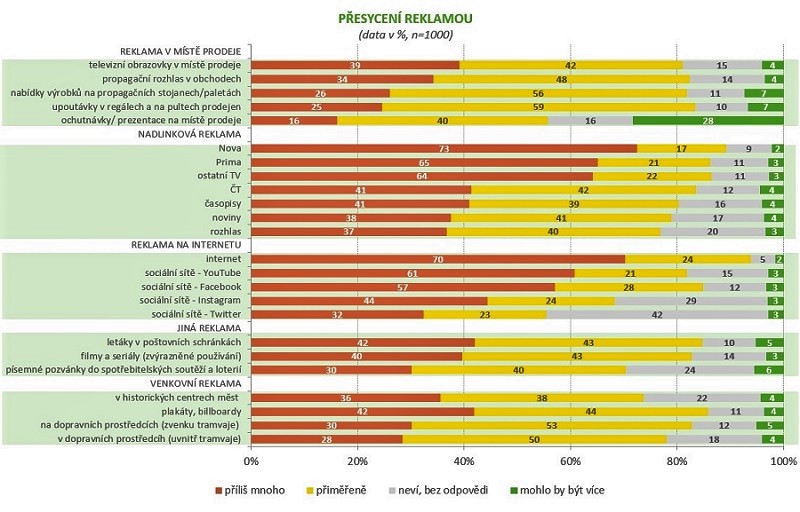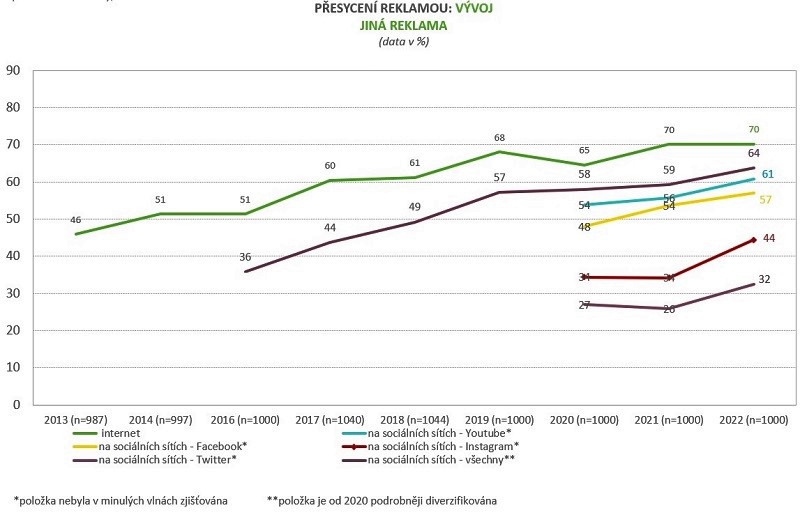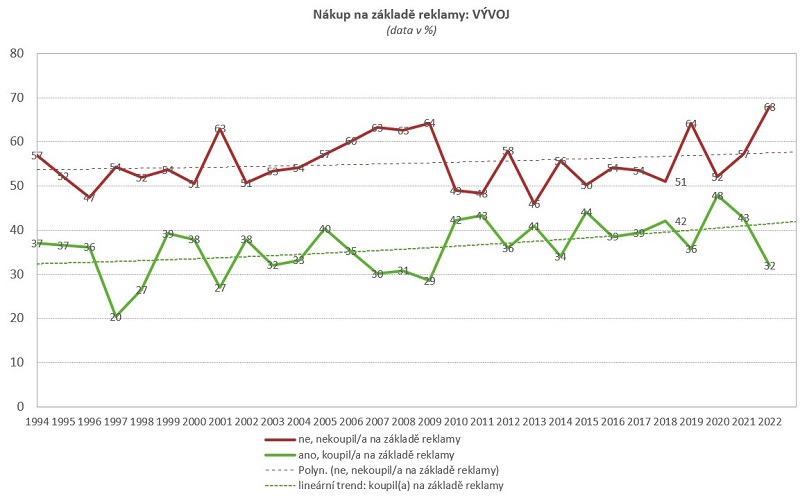The feeling of Czech users being over-saturated with the level of advertising on social networks is increasing. This is especially true for Facebook and YouTube, where on average around 60% of respondents report being over-saturated with advertising. The survey was conducted by the research agency ppm factum research.
The research also showed that viewers perceive oversaturation of advertising mainly at commercial TV stations Nova and Prima and also on the Internet. On the other hand, they consider the amount of advertising in above-the-line media to be adequate, especially on Czech Television, newspapers, magazines and radio. In all these cases, the values are comparable.
Overall, advertising at the point of sale (especially trailers on shelves and counters in shops and product offers on promotional displays) and outdoor advertising (especially on vehicles and inside vehicles) are perceived as the most acceptable. Consumers feel that more tastings and presentations at the point of sale could be provided.
"People still perceive the intensity of advertising to be mainly on commercial TV, although oversaturation has decreased compared to last year. In this context, it should be added that oversaturation does not mean that advertising does not influence purchasing behaviour. A third of those who admit to buying on the basis of advertising cite television as a source of information. The oversaturation of advertising on the internet and social networks continues to grow, most recently on Facebook and YouTube," the report Czechs and Advertising 2022 says.
 Source: Czechs and advertising 2022
Source: Czechs and advertising 2022 Source: Czechs and advertising 2022
Source: Czechs and advertising 2022The proportion of people who admit to buying based on advertising is falling for a second year. Last year it fell by 5%, and this year by a further 11%, leaving 32% of respondents admitting to making a purchase. These are mainly younger age groups under 30. Over the course of the survey, the proportion of those who admit to buying has averaged between 30-40%. The most frequently mentioned advertisements that have influenced purchasing behaviour are spots from food retailers (e.g. Lidl, Tesco).
"The proportion of those who say that information from advertising helps them to make a purchase has also decreased, especially for the answers 'advertising rather helps'. We have been observing a decline for the last 2 years. Currently, 27% of the Czech population consider advertising to be a welcome source of information," commented David Říha from the Department of Marketing at the Faculty of Marketing of the University of Economics in Prague, which is involved in the research.
"It is still true that the admission of buying based on advertising must be interpreted in a broader context. We have to take into account the fact that a part of the population will not 'admit' buying based on advertising, either because they are not aware of the influence or because they do not want to admit it. In previous investigations we have related this to the phenomenon of 'manipulation' in general and the actual purchase, i.e. 'manipulation by me', where clear differences have been found. These persist to this day. The general perception of the manipulative function of advertising is still much higher than the fact that we are aware of and acknowledge in our own actions,"
added Jitka Vysekalová, the author and founder of the research.
 Source: Czechs and advertising 2022
Source: Czechs and advertising 2022Other conclusions from the study:
- The Czech public continues to be tolerant of the perception of erotic advertising and sexual themes in advertising. An extreme attitude, i.e. outrage and demanding a ban on such advertising, was expressed by 6% of respondents this year (compared to 4% last year). Part of the population expresses a negative attitude but does not call for a ban. Men are more tolerant than women, and are more likely to like advertisements, especially if they are relevant to the product being promoted.
- As in previous surveys, restrictive attitudes are most pronounced for cigarette advertising, followed by hard alcohol, while tolerant attitudes towards beer, wine and over-the-counter medicines persist.
- Overall, negative attitudes towards advertising prevail in the population, with a strong contribution from advertising interrupting TV programmes, advertising aimed at children and a general attitude towards the manipulative function of advertising. Its 'advisory function' in the choice of goods is relatively most frequently cited as a positive factor, and more than half of the population considers it to be part of modern life.
- It is well known from many previous surveys what people expect from advertising. Around the mid-1990s, attitudes almost stabilised and since then there have been only slight fluctuations. The requirements that advertising should provide truthful and trustworthy information presented in an understandable way have long been at the top of the list. Decency, non-violence and credibility still dominate the requirements for advertising. Truthfulness has been ranked first throughout the survey.
- The proportion of people who tolerate advertising and recognise its necessity for the economy, but do not need it personally, increased between 2013 and 2020. In the last two years, we have seen stagnation in this category. Gradually - albeit at a slow pace - the number of those who "hate advertising" is increasing (15% in 2013, 23% this year).
Czechs and advertising 2022
- Target group: online population of the Czech Republic aged 15+
- Method: CAWI Omnibus ppm factum
- Data collection: 17-26 January 2022
- Selection: representative sample with quotas for gender, age, education, size of place of residence, region
- Sample size: 1000
- Analysis: processing with SPSS statistical software, data cleaning, sorting
- Sponsor of the research: Czech Marketing Society (CMS), POPAI CE , Czech Association for Branded Products (ČSZV) and Faculty of Business Economics of the University of Economics in Prague (FPH VŠE)
- Implementer: ppm factum
Source: mediaguru.cz

